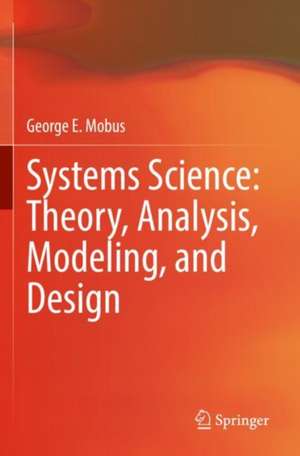Systems Science: Theory, Analysis, Modeling, and Design
Autor George E. Mobusen Limba Engleză Paperback – 11 mar 2023
| Toate formatele și edițiile | Preț | Express |
|---|---|---|
| Paperback (1) | 666.89 lei 6-8 săpt. | |
| Springer International Publishing – 11 mar 2023 | 666.89 lei 6-8 săpt. | |
| Hardback (1) | 922.10 lei 6-8 săpt. | |
| Springer International Publishing – 10 mar 2022 | 922.10 lei 6-8 săpt. |
Preț: 666.89 lei
Preț vechi: 784.57 lei
-15% Nou
Puncte Express: 1000
Preț estimativ în valută:
127.61€ • 133.51$ • 106.01£
127.61€ • 133.51$ • 106.01£
Carte tipărită la comandă
Livrare economică 03-17 aprilie
Preluare comenzi: 021 569.72.76
Specificații
ISBN-13: 9783030934842
ISBN-10: 3030934845
Pagini: 814
Ilustrații: XXI, 814 p. 174 illus., 156 illus. in color.
Dimensiuni: 155 x 235 mm
Greutate: 1.15 kg
Ediția:1st ed. 2022
Editura: Springer International Publishing
Colecția Springer
Locul publicării:Cham, Switzerland
ISBN-10: 3030934845
Pagini: 814
Ilustrații: XXI, 814 p. 174 illus., 156 illus. in color.
Dimensiuni: 155 x 235 mm
Greutate: 1.15 kg
Ediția:1st ed. 2022
Editura: Springer International Publishing
Colecția Springer
Locul publicării:Cham, Switzerland
Cuprins
Part I. Foundations of Systems Understanding.- Principles of Systems Science.- System Ontology.- System Language.- Fundamentals of Systems Analysis & Design.- Part II. Analysis of Systems.- The Process of Systems Analysis.- Demonstrating the Analysis of Various Kinds of Systems: How the Ontology is Universal.- Examining the Knowledgebase.- Detailed Analysis for Understanding - A Look at a Biophysical Economics System.- Part III. Modelling of a Complex System.- Generating Models from the Knowledgebase.- Testing and Verifying Models and the Knowledgebase.- Part 4. Design for Free.- Governance Systems.- Model Scenarios and the Construction of Policies.- Design Specification.
Notă biografică
George E. Mobus is Associate Professor Emeritus of Computer Science & Systems and Computer Engineering & Systems in the School of Engineering and Technology at the University of Washington Tacoma. He received his PhD in computer science from the University of North Texas in 1994. His dissertation, and subsequent research program at Western Washington University (under National Science Foundation Grant No. IIS-9907102), involved developing autonomous robot agents by emulating natural intelligence as opposed to using some form of artificial intelligence. Mobus was awarded US Patent: #5,504,839, "Processor and Processing Element for Use in a Neural Network". He also received an MBA from San Diego State University in 1983, doing a thesis on the modeling of decision support systems based on the hierarchical cybernetic principles presented in this volume and in numerous papers. His baccalaureate degree was earned at the University of Washington (Seattle) in 1973, in zoology. He studied the energetics of living systems and the interplay between information, evolution, and complexity.
Before completing his academic pursuits of a Ph.D., he had risen through the ranks of a small controls engineering company in Southern California, from software engineer to the top spot. The credit for success goes to the education he got in systems sciences during his MBA program and helping reshape many of the internals of the company that improved profitability and work conditions.
Before completing his academic pursuits of a Ph.D., he had risen through the ranks of a small controls engineering company in Southern California, from software engineer to the top spot. The credit for success goes to the education he got in systems sciences during his MBA program and helping reshape many of the internals of the company that improved profitability and work conditions.
Textul de pe ultima copertă
This book describes a comprehensive approach to applying systems science formally to the deep analysis of a wide variety of complex systems. Detailed ‘how-to’ examples of the three phases (analysis-modeling-design) of systems science are applied to systems of various types (machines, organic (e.g. ecosystem), and supra-organic (e.g. business organizations and government). The complexity of the global system has reached proportions that seriously challenge our abilities to understand the consequences of our use of technology, modification of natural ecosystems, or even how to govern ourselves. For this reason, complex mathematics is eschewed when simpler structures will suffice, allowing the widest possible audience to apply and benefit from the available tools and concepts of systems science in their own work. The book shows, in detail, how to functionally and structurally deconstruct complex systems using a fundamental language of systems. It shows how to capture the discovered details in a structured knowledge base from which abstract models can be derived for simulation. The knowledge base is also shown to be a basis for generating system design specifications for human-built artifacts, or policy recommendations/policy mechanisms for socio-economic-ecological systems management. The book builds on principles and methods found in the authors’ textbook Principles of Systems Science (co-authored with Michael Kalton), but without prerequisites. It will appeal to a broad audience that deals with complex systems every day, from design engineers to economic and ecological systems managers and policymakers.
Caracteristici
Provides principled explanations of the process for gaining understanding of complex systems Focuses on design principles for engineers and others as well as the analysis of extant systems Covers methods and provides examples of how to use a knowledge base to derive abstract models for computer simulation
